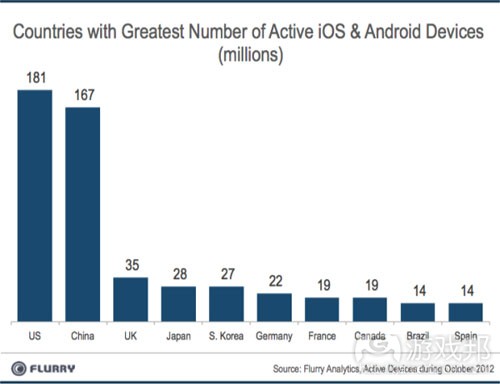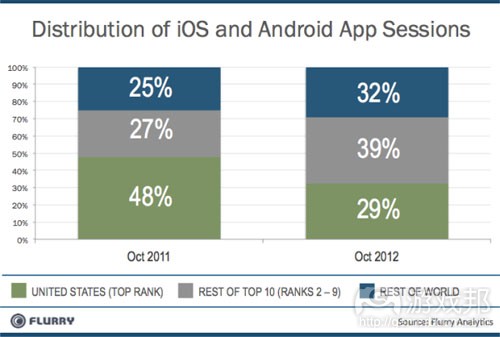每日观察:关注中国iOS和Android设备安装量(11.29)
1)据pocketgamer报道,Distimo最新数据显示微软Windows 8应用商店Windows Store表现强劲,目前共有2万款应用,其发展速度超过了上线将近两年的Mac App Store,后者目前应用数量仅为1.3万。
从下载量来看,这个微软应用商店上线首月的情况同样超过苹果Mac App Store,其前300名热门应用的日常下载量是Mac App Store前300名应用的3倍。
但从付费应用下载量来看,苹果则更胜一筹。
Distimo认为微软在推荐本土内容这一点上表现良好,从总体上看,其排名榜单中有10%应用属于本土热门产品。例如在日本,该应用商店前300名应用中,有41%属于本土热门产品,在韩国市场也有30%热门应用属于仅在本土受到欢迎的产品。
Distimo指出该平台仅有65%的应用瞄准的是美国市场,而多数应用商店中针对美国用户的应用比例高达85%。由此可见,Windows Store中有大量开发者是针对特定地区,而非全球市场发布应用。
2)Flurry最新报告预测,2013年第一季度中国iOS和Android设备安装量将超过美国,美国市场只能通过假期季实现这两种设备安装量的短暂飙升(游戏邦注:Flurry报告数据取自其追踪的25万款应用程序以及7.5亿台移动设备) 。
截止2012年10月份,美国市场的iOS和Android活跃设备安装量为1.81亿,而中国则是1.67亿。这两个市场的安装量均超过英国、日本、韩国、德国、法国、加拿大、巴西和西班牙等国家的5倍。自2011年10月以来,美国设备安装量增长了5500万,而中国则增加了1.25亿(超过了目前英国、日本和韩国安装量的总和)。
从2011年10月至2012年10月,得益于中国庞大的人口和不断崛起的中产阶段群体,中国活跃设备安装量增长了293%。
报告还发现,美国Android和iOS的应用使用率明显下滑,在2011年10月,美国应用使用率为48%,但现在却降至29%。与此同时,位居前10名的其他国家(即第2至第9名)的应用使用率则从27%增长至39%,世界其他市场的使用率则从25%增长至32%;有71%的应用使用率来自美国之外的地区。
3)MyVoucherCodes最近调查报告显示,有40%英国用户从未下载付费应用。这项调查对象是2600名英国智能手机用户,其中有32%偶尔会购买付费应用,有27%经常下载付费应用。
在那些从未下载付费应用的群体中,有53%表示自己认为这些付费产品并非物有所值,29%表示这些应用“太贵了”。
在偶尔会购买付费应用群体中,有71%表示自己最可能为社交网络应用付费,有64%会为新应用付费,59%会为游戏应用掏钱,有57%会选择体育/健康应用,51%会花钱下载美食/烹饪应用
与此同时,经常购买应用的消费者表示,自己每月在应用程序上的平均开销是5.2英磅。
4)据gamasutra报道,手机游戏工作室Boomlagoon宣布获得来芬兰Jari Ovaskainen以及游戏投资团体London Venture Partners的投资,但并未透露具体金额。
值得注意的是,Jari Ovaskainen和London Venture Partners同时也是另一家芬兰开发商Supercell的投资者。
据彭博社报道,芬兰电子游戏行业规模同比上年增长57%,除了Boomlagoon和Supercell之外,《Shadow Cities》开发商Grey Area、手机游戏广告平台Applifier以及Rovio等芬兰公司也已接受国际风投资金。
Boomlagoon于今年初由三名前Rovio开发者(Antti Sten、Tuomas Erikoinen和Ilkka Halila)创办,即将发布其首款游戏。
5)据gamasutra报道,手机游戏平台Heyzap日前推出一个免费的积分排行榜SDK,其排行榜系统支持iOS和Android跨平台运行,并含有一个向其他玩家发送即时通知消息的挑战机制。
Heyzap位于旧金山,目前已有3000款游戏绑定其游戏平台。
6)移动分析公司adeven最近发布信息图表指出,10月份有62%的iOS应用无法跻身苹果App Store热门应用榜单,从而沦为“僵尸”应用。
10月份仅有32%的应用能够维持在App Store的榜单排名。从全球应用生态圈来看,10月份发展最为迅速而稳定的应用当属《Need for Speed Most Wanted》,该游戏发布仅2天就跻身全球榜单第34名,目前仍稳居热门榜单前50名。
(本文为游戏邦/gamerboom.com编译,拒绝任何不保留版权的转载,如需转载请联系:游戏邦)
1)Windows Store daily downloads already 3 times higher than on Mac App Store
by Keith Andrew
Beyond an initial declaration that the platform was off to a stronger start than its predecessor, Microsoft is yet to put a recent number on the number of consumers who have picked up Windows 8 to date.
Nonetheless, figures released by Distimo suggest one of the platform’s major new ventures – the built in app store – is performing strongly.
Racing ahead
In all, Distimo claims 20,000 apps have launched on the marketplace already. That puts the store ahead of the almost two year old Mac App Store, which currently boasts just 13,000 apps in comparison.
When it comes to downloads, Microsoft has also eased ahead of Apple within its first month, with Distimo claiming the top 300 apps on Windows Store are generating three times the daily downloads the equivalent 300 are amassing on the Mac App Store.
In terms of the paid volume generated, however, Distimo claims Apple is still easily ahead.
Going local
If Distimo’s report is to believed, it’s not the sheer strength of the Windows platform with consumers that is ensuring the Windows Store is a success, but also Microsoft’s move to ensure it appeals to all audiences.
“Microsoft did a good job in giving local content more visibility in the Windows Store,” reports Distimo.
“Overall, 10 percent of all applications in the rankings are locally popular only. This is even higher when we disregard the small countries. In Japan, for example, 41 percent of all top 300 applications are locally popular only, and also in Korea, where about 30 percent of all top applications are locally popular only.”
So tailored is the store, in fact, that Distimo claims just 65 percent of its total are available in the US – that’s compared to the 85 percent ratio in most stores. In short, a huge
number of developers are launching apps in specific regions, rather than worldwide.(source:pocketgamer)
2)Flurry: China predicted to usurp US iOS and Android install base by Q1 2013
Scott Reyburn
China will surpass the U.S. in iOS and Android device install base by Q1 2013′s end, predicts mobile app monetization company Flurry.
The company’s prediction comes from a new report released today, focusing on which countries have the largest active iOS and Android device install base, which countries are showing the fastest growth and how app usage is shifting across the globe. Flurry believes only a holiday season that will spike the U.S. install base would prevent China from passing up the U.S. in a shorter amount of time.
The top two countries by active iOS and Android install base as of Oct. 2012 are the U.S. with 181 million active devices and China with 167 million. Both countries have a markedly higher install base by at least five times more than other countries including the U.K., Japan, South Korea, Germany, France, Canada, Brazil and Spain. Since Oct. 2011, the U.S. added 55 million devices to its install base while China added 125 million, a figure that is larger than the current install base for the U.K., Japan and South Korea combined.
From Oct. 2011 to Oct. 2012, China had the most growth in active devices with an increase of 293 percent, which Flurry attributed to the combination of the country’s population and growing middle class. Since Flurry’s prior international growth report, a new set of countries are in the top 10 including Colombia, Ukraine, Venezuela and the Philippines. The countries selected for the chart had a minimum of half a million active devices as of Oct. 2011.
The report also looked at the worldwide distribution of iOS and Android app usage, showing a significant drop in app usage for the U.S.
In Oct. 2011, 48 percent of app usage was in the U.S., but a year later dropped to 29 percent. The rest of the top 10 (ranks 2-9) grew their usage from 27 percent to 39 percent in 12 months. The rest of the world grew from 25 percent to 32 percent. As it stands, 71 percent of app usage take place outside the U.S., according to Flurry.
Flurry pulled data for this report from more than 250,000 apps that it tracks, running on more than 750 million devices worldwide. The company says it can detect 90 percent of all active iOS and Android devices around the world in a given month.(source:insidemobileapps)
3)40 per cent of Brits refuse to pay for apps
by Daniel Gumble
UK consumers unhappy to part with cash for their apps.
Smartphone owners in the UK seem more than a little reluctant to part with cash for their mobile apps, after a survey by MyVoucherCodes showed that 40 per cent of Brits never download paid-for apps.
The survey of 2,600 smartphone owners also revealed that 32 per cent occasionally pay for apps, while 27 per cent claim that they do so on a regular basis.
When those who never pay for apps were asked to explain why, 53 per cent said that they ‘didn’t think they were worth it’. 29 per cent, however, insisted that they ‘couldn’t afford’ to pay for apps.
Those who claimed that they would occasionally pay for apps said that they would be most likely to pay for social networking apps (71 per cent). The second most popular choice was new apps with 64 per cent, while 59 per cent stated that they would be most likely to spend on game apps. Sports/fitness apps came in at fourth with 57 per cent and food/recipe apps took fifth with 51 per cent.
Meanwhile, regular app buyers revealed that the average amount they would spend on apps each month was around £5.20.
Mark Pearson, chairman of MyVoucherCodes, said of the results: “It was quite interesting to see how many people don’t actually pay for apps. They can seem quite expensive at the time, but when you consider that some are just 69p, it’s not all that much in the grand scheme of things!”(source:mobile-ent)
4)Angry Birds defectors latest to score in Finnish game investment boom
By Frank Cifaldi
A trio of defectors from Angry Birds maker Rovio are the latest to benefit from a rush of investment money being thrown at mobile game developers in Finland.
Developer Boomlagoon — which Gamasutra first revealed in April — has received investment funding from Finland’s Jari Ovaskainen and game investment group London Venture Partners. The sum of the investment was not disclosed.
The duo of Ovaskainen and LVP are also investors in Finnish developer Supercell.
The Finnish video game industry has grown 57 percent year-on-year, according to a recent report from Bloomberg. In addition to Boomlagoon and Supercell, Shadow Cities developer Grey Area, mobile game ad network Applifier and Rovio itself have also been the recipients of international venture money as of late.
Boomlagoon was founded by industry veterans (and Angry Birds developers) Antti Sten, Tuomas Erikoinen and Ilkka Halila earlier this year. The first of what Ovaskainen describes as “a compelling pipeline of upcoming titles” is launching “soon.” (source:gamasutra)
5)Free Heyzap leaderboard SDK hope to attract those burned by OpenFeint
By Frank Cifaldi
Mobile game network Heyzap is hoping to attract those burned by OpenFeint’s surprise shutdown with a free leaderboard SDK.
Its Leaderboards system works cross-platform with iOS and Android, and has a challenge mechanic that sends real-time notifications to other players.
The SDK is available publicly today over at the Heyzap website.
San Francisco-based Heyzap has been growing in popularity as a mobile game network, having attracted 3,000 game titles to date, according to the company. (source:gamasutra)
6)INFOGRAPHIC: 62 per cent of iOS apps became ‘zombies’ in October
by Daniel Gumble
Over half of last month’s apps failed to rank in the App Store.
Last month (October) saw 62 per cent of iOS apps fail to make the rankings in Apple’s App Store, rendering them ‘zombies’, mobile analytics firm adeven has revealed.
The findings also show that just 32 per cent of apps were able to maintain steady positions in the App Store throughout October.
Topping the list of October’s fastest moving apps in the global app ecosystem was Need for Speed Most Wanted, which reached global rank position 34 only two days after release. It has since held a steady position amongst the top 50 ranking apps.
Christian Henschel, CEO and co-founder of adeven, explained that in the app world, quality and clever marketing can make a crucial difference. “Apps can shoot up the ranking thanks to clever marketing campaigns but they won’t stay there long if they aren’t any good or don’t receive constant marketing.
“If an app plummets, say dropping 249,694 ranking spots in the global rank in just one day, then you need to ask why.”(source:mobile-ent)






























.jpg)















 闽公网安备35020302001549号
闽公网安备35020302001549号